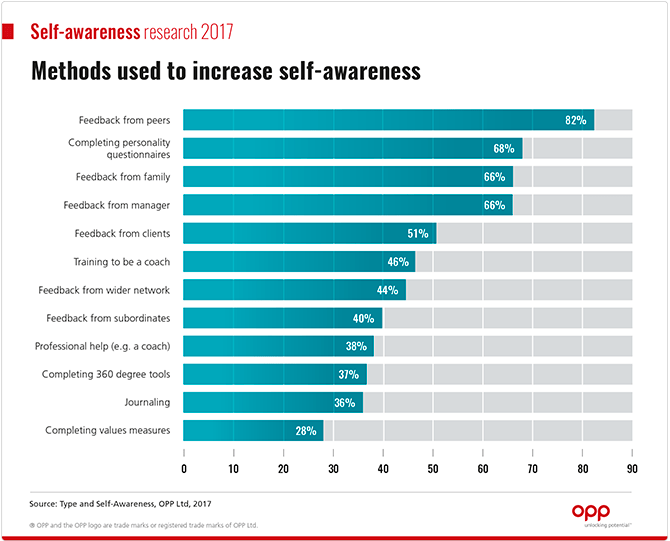Raising self-awareness: What works?
Helen Rayner, Lead Consultant, OPP
In our first blog post, we discussed how respondents developed their self-awareness. Seeing as we also asked respondents what their MBTI best-fit type was, we explored whether people with different type preferences used the same or different methods to develop their self-awareness. But did different types find some methods more effective for developing self-awareness?
Extraversion
Those with preferences for Extraversion were more likely to mention feedback from clients, their wider network, subordinates and 360 degree tools as particular ways they have developed their self-awareness. We know that those with preferences for Extraversion are orientated to the world around them, including other people. What is interesting here, and links to Extraversion, is that all of these sources of feedback are external to the respondent.
Sensing
Those with preferences for Sensing said that receiving feedback from their manager had helped to increase their self-awareness. We might expect feedback that comes from a manager to be related to specific projects/tasks, KPIs or their interpersonal style. Of course, what we do not know is the MBTI type of the manager giving feedback; this may well flavour the type and style of feedback they give to their direct reports.
iNtuition
Those with preferences for iNtuition noted that their wider network, training to be a coach, receiving coaching and completing values measures were ways in which they had developed their self-awareness. These methods are more systemic, which may be why they are preferred by those who have preferences for iNtuition.
Feeling
Journaling and Feeling preferences were related. Journaling provides a way of reflecting on how thoughts, actions and insights might relate to values and feelings. It is interesting that we did not see any significant differences between those with preferences for Extraversion and Introversion here. From the respondents to this survey, we note that journaling is not exclusive to those with preferences for Introversion.
Perceiving
Feedback from clients and their wider network, as well as receiving professional help (eg coaching) were ways in which those with Perceiving preferences had developed their self-awareness. Specifically, it was those with NFP preferences who were more drawn to these methods, which are more systemic and holistic. People with preferences for NFP are likely to find the big picture, patterns, connections and a focus on people and relationships more appealing than people with STJ preferences.
Ways of increasing self-awareness

Most frequently-used methods to increase self-awareness
- 82% of people had received feedback from their peers
- 68% had completed a personality questionnaire. As everyone knew their MBTI best-fit type, we understood this as 68% of respondents had completed additional personality questionnaires
- 66% of respondents said they had developed their self-awareness through feedback from a manager
- 66% of respondents said they had received feedback from their family too
Usefulness of feedback
Although it can be quite straightforward to gain feedback from peers and managers, it is noticeable that respondents did not rate these as being the most useful ways of developing self-awareness. Instead, the top three most effective ways of developing self-awareness were as follows:
- Training to become a coach
- Professional help (eg receiving coaching)
- Completing personality questionnaires
We know that 66% of people have received feedback from a manager, but this did not make the top three most useful methods. If you are a manager, what do you think your reports might say about this?
Our parting question is this: do you think you are using the most effective methods for developing your self-awareness? And, if not, what steps could you take to improve the quality of the feedback you are giving or receiving?
We hope you have enjoyed this series of blog posts on self-awareness. If you would like to talk further about how we might be able to support you to develop your self-awareness, please do get in touch.
Finally, we would like to thank all the respondents who took the time to complete our survey.
Related material: